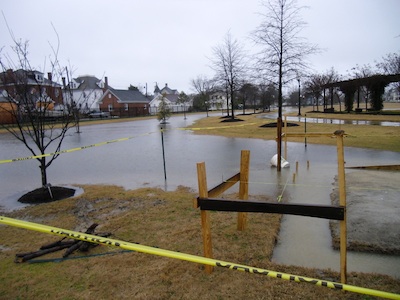Judge Upholds Town Council on Park Bathroom

Site of future Central Park bathrooms. Due to flooding conditions, bathroom floor will be elevated to height of wooden crossmember behind yellow tape. Access will be via a 60-foot winding ramp. (Wave photo)
By DORIE SOUTHERN
Cape Charles Wave
May 9, 2013
For the third time this year, Cape Charles Town Council yesterday found itself before Circuit Court Judge Revel Lewis in a case brought by a Town resident.
Yesterday, for the third time, Judge Lewis found in favor of the Town.
The two earlier cases concerned Town Council’s rezoning of Central Park property and transfer of the Old School and related park property to a real estate developer.
Yesterday’s case was also about Central Park –- this time concerning plans to build a bathroom.
Town resident Donald Riley argued that plans for the bathroom to mirror the design of an adjoining c.1980 sewage pump station violated the Town’s Historic Guidelines.
He further argued that the bathroom site was illegal because it did not meet the 20-foot setback requirement.
In yesterday’s case, as well as in the earlier cases, Judge Lewis declined to consider substantive arguments. He earlier ruled that his court had no jurisdiction, and yesterday decided that Riley had no standing.
The Wave learned this week that the first two cases, concerning the Old School, have been appealed to the state Supreme Court.
CONTINUED FROM FIRST PAGE
Riley said he will not appeal his case, although he expressed surprise that the judge accepted the defense’s argument of no standing.
Acting for the Town, Richmond defense attorney John Conrad cited a February 1986 Virginia Supreme Court decision, Virginia Beach Beautification Commission v. Board of Zoning Appeals of the City of Virginia Beach, where the court upheld a decision that the Beautification Commission had no standing to appeal a decision by the Board of Zoning.
The court found that “the Commission neither owns nor occupies real property within or in close proximity to the property that is the subject of the variance application . . . the organization is merely a nonstock corporation with no specific property interests to be damaged.”
Riley, who represented himself, told the Wave afterward that he couldn’t believe that Judge Lewis equated his situation with that of the Virginia Beach Beautification Commission. Whereas the Commission owned no property, Riley owns and resides in property only half a block from the proposed park bathrooms.
The defense further argued that Cape Charles Town Council “is entitled to legislative immunity.”
Riley had appealed the Town’s decision in accordance with Section 8.15 of the Town Zoning Ordinance, which states that Town Council decisions may be appealed to the Northampton Circuit Court.
During his plea, Riley explained to Judge Lewis that he originally sought and obtained legal counsel, but the law firm dropped out at the last minute, citing a possible conflict of interest. Riley thus was forced to take on the case himself.
Judge Lewis began by accepting for the record all the documents provided by attorney Conrad while denying all the documents provided by Riley, categorizing the letters, petitions, and newspaper articles as “hearsay” not admissible in court.
Riley said that he was not the only one affected by the proposed bathroom and that it should be a matter of concern to everyone who lives in the Historic District. He noted that he was not asking for any personal benefit.
A Town resident who attended the hearing in support of Riley lives in the house that will directly face the proposed bathroom. She volunteered to address the court, but Judge Lewis did not allow it.
The failure of the building to meet the requirements of the Historic District Guidelines was not considered. The Guidelines state: “Look at surrounding buildings to determine their style, age, and the elements that help define the neighborhood’s special character . . . Choose a design that relates to the design character of the historic buildings in the area.”
The Zoning Ordinance for the Open Space District states: “Setback requirements for buildings are 20 feet on all sides.” The setback for the proposed bathroom is 8 feet.
After the ruling, Riley told the Wave that he had done all that he could, and the people of Cape Charles would have to put up with what they got.




















WHAT HAPPENED TO JUSTICE IN AMERICA, I don’t think it can be found in Northampton County. Judge Lewis once again sidestepped the issues of the case and sought a political solution. This after not allowing the plaintiff to even properly present his case.
The town council can act illegaly, and the people of the town have no redress through the courts – is this America or some third world dictatorship?
WHEN THE SYSTEM IS BROKEN — IT NEEDS TO BE FIXED!
So…the ciizens of Cape Charles voicing their concerns by signature are considered hearsay and a citizen who files a suit against the town is considered to have no standing and the court has no jurisdiction? WHO DOES?
Just another example of government DICTATING to it’s citizens and an idiot judge backing them up! Looking forward to the next election.
Judge Lewis needs to do his job instead of hiding behind these stupid decisions.
Decisions that let him off the hook.
There is no justice for the citizens of Cape Charles and no one to go to for help.
The park bathrooms are in a bad location and the design is all wrong.